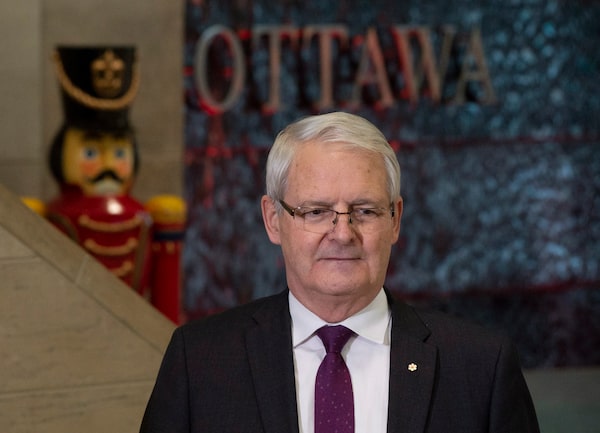
Transport Minister Marc Garneau during a news conference at the airport in Ottawa, on Dec. 17, 2018.Adrian Wyld/The Canadian Press
The federal government says it will not expedite its deliberations on whether to ban Huawei Technologies Co. Ltd. from Canada’s 5G networks – despite a warning from U.S. Secretary of State Mike Pompeo that he will stop sharing intelligence with countries that fail to take action against the Chinese telecommunications giant.
On Thursday Mr. Pompeo stepped up his country’s campaign to press its allies to follow Washington’s lead and bar Huawei from supplying components to internet and telephone infrastructure.
“If a country adopts this and puts it in some of their critical information systems, we won’t be able to share information with them, we won’t be able to work alongside them,” he said on Fox Business. “There is a real risk – and we want to make sure they know – not only the risk to their own people but their risk of being able to work alongside the United States in keeping the world safe.”
Minister of Transport Marc Garneau, in Washington for trade meetings, shrugged off Mr. Pompeo’s threat. He said Canada would do “its own due process” on deciding how to handle Huawei. Canada has not set out a timeline for a decision.
“You don’t hurry up something that you need to do in the proper manner. There’s no need to panic here,” Mr. Garneau, chair of the cabinet’s Canada-U.S. relations committee, said after an event. “We’re doing the thing that we need to do in order to come to our own decision in Canada about what our approach will be to Huawei.”
The United States fears Huawei and other Chinese technology companies will use access to 5G networks to gather information on U.S. citizens and forward it to Beijing’s spy agencies. Chinese telecommunications companies are obligated to share information with the government.
U.S. allies have been considering how to handle Huawei. Of the Five Eyes countries that share intelligence, only the United States and Australia have completely banned the company from their networks. British officials suggested this week that it might be possible to contain the risk without barring the company entirely.
“Everything is on the table … no decisions have been taken,” Ciaran Martin, head of Britain’s National Cyber Security Centre, told a conference in Brussels Wednesday. “5G security is not a simple, binary choice.”
Canada is already caught in a vise between its closest ally and the world’s most powerful autocracy. In December, Canadian authorities arrested Huawei chief financial officer Meng Wanzhou at the request of the United States. China subsequently detained two Canadians in apparent retaliation. Ms. Meng, the daughter of Huawei’s founder, is accused of taking part in a plot to circumvent U.S. sanctions on Iran. She is out on bail in Vancouver while extradition proceedings unfold.
The United States is also embroiled in a trade war with Beijing. President Donald Trump accuses China of hollowing out the U.S. manufacturing sector by getting factories to move to the low-wage country.
David MacNaughton, Canada’s ambassador to the United States, said the Trump administration had not spoken with him directly about cutting off the intelligence flow in the event Ottawa allows Huawei on its networks.
“I have never heard any talk like that. Obviously they have made their position clear on Huawei, but we are going through our national security review,” he said.
He said it was not clear when Canada would make up its mind.
“The government will make a decision on that in due course, when all of the information is in front of them,” he said. “I don’t know when exactly that’s going to be.”
 Adrian Morrow
Adrian Morrow